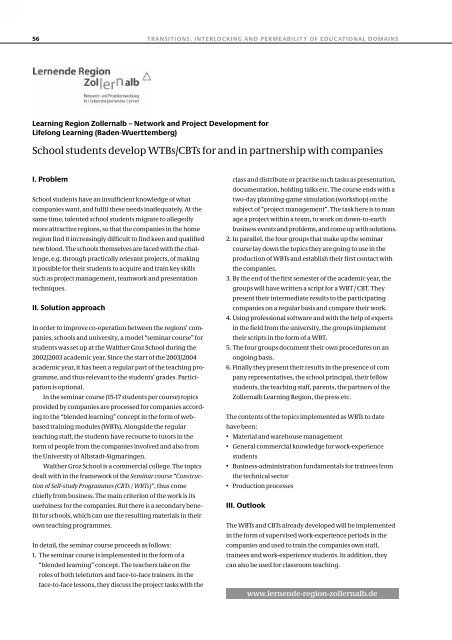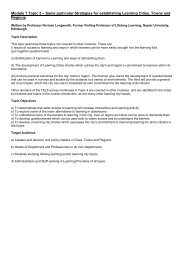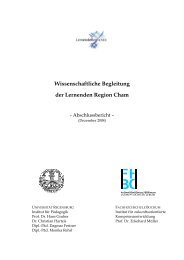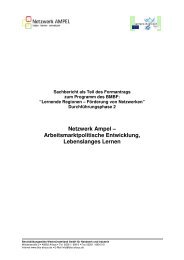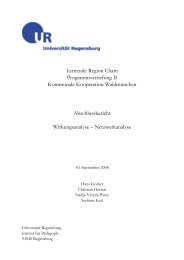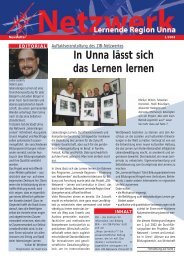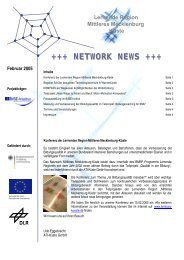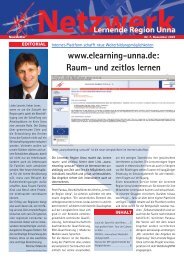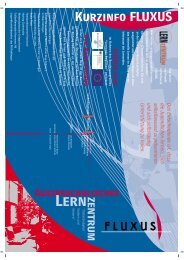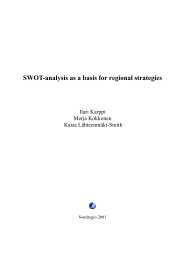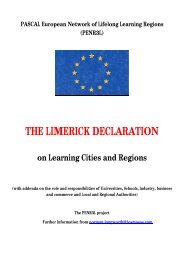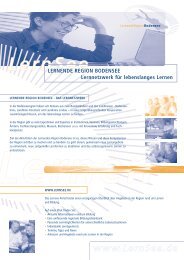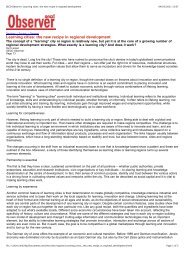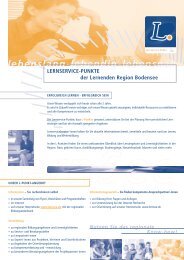Die Strategie für das Lebenslange Lernen ... - EUROlocal
Die Strategie für das Lebenslange Lernen ... - EUROlocal
Die Strategie für das Lebenslange Lernen ... - EUROlocal
Sie wollen auch ein ePaper? Erhöhen Sie die Reichweite Ihrer Titel.
YUMPU macht aus Druck-PDFs automatisch weboptimierte ePaper, die Google liebt.
56<br />
TRANSITIONS, INTERLOCKING AND PERMEABILITY OF EDUCATIONAL DOMAINS<br />
Learning Region Zollernalb – Network and Project Development for<br />
Lifelong Learning (Baden-Wuerttemberg)<br />
School students develop WTBs/CBTs for and in partnership with companies<br />
I. Problem<br />
School students have an insufficient knowledge of what<br />
companies want, and fulfil these needs inadequately. At the<br />
same time, talented school students migrate to allegedly<br />
more attractive regions, so that the companies in the home<br />
region find it increasingly difficult to find keen and qualified<br />
new blood. The schools themselves are faced with the challenge,<br />
e.g. through practically relevant projects, of making<br />
it possible for their students to acquire and train key skills<br />
such as project management, teamwork and presentation<br />
techniques.<br />
II. Solution approach<br />
In order to improve co-operation between the regions’ companies,<br />
schools and university, a model “seminar course” for<br />
students was set up at the Walther Groz School during the<br />
2002/2003 academic year. Since the start of the 2003/2004<br />
academic year, it has been a regular part of the teaching programme,<br />
and thus relevant to the students’ grades. Participation<br />
is optional.<br />
In the seminar course (15-17 students per course) topics<br />
provided by companies are processed for companies according<br />
to the “blended learning” concept in the form of webbased<br />
training modules (WBTs). Alongside the regular<br />
teaching staff, the students have recourse to tutors in the<br />
form of people from the companies involved and also from<br />
the University of Albstadt-Sigmaringen.<br />
Walther Groz School is a commercial college. The topics<br />
dealt with in the framework of the Seminar course “Construction<br />
of Self-study Programmes (CBTs / WBTs)”, thus come<br />
chiefly from business. The main criterion of the work is its<br />
usefulness for the companies. But there is a secondary benefit<br />
for schools, which can use the resulting materials in their<br />
own teaching programmes.<br />
In detail, the seminar course proceeds as follows:<br />
1. The seminar course is implemented in the form of a<br />
“blended learning” concept. The teachers take on the<br />
roles of both teletutors and face-to-face trainers. In the<br />
face-to-face lessons, they discuss the project tasks with the<br />
class and distribute or practise such tasks as presentation,<br />
documentation, holding talks etc. The course ends with a<br />
two-day planning-game simulation (workshop) on the<br />
subject of “project management”. The task here is to man<br />
age a project within a team, to work on down-to-earth<br />
business events and problems, and come up with solutions.<br />
2. In parallel, the four groups that make up the seminar<br />
course lay down the topics they are going to use in the<br />
production of WBTs and establish their first contact with<br />
the companies.<br />
3. By the end of the first semester of the academic year, the<br />
groups will have written a script for a WBT / CBT. They<br />
present their intermediate results to the participating<br />
companies on a regular basis and compare their work.<br />
4. Using professional software and with the help of experts<br />
in the field from the university, the groups implement<br />
their scripts in the form of a WBT.<br />
5. The four groups document their own procedures on an<br />
ongoing basis.<br />
6. Finally they present their results in the presence of com<br />
pany representatives, the school principal, their fellow<br />
students, the teaching staff, parents, the partners of the<br />
Zollernalb Learning Region, the press etc.<br />
The contents of the topics implemented as WBTs to date<br />
have been:<br />
• Material and warehouse management<br />
• General commercial knowledge for work-experience<br />
students<br />
• Business-administration fundamentals for trainees from<br />
the technical sector<br />
• Production processes<br />
III. Outlook<br />
The WBTs and CBTs already developed will be implemented<br />
in the form of supervised work-experience periods in the<br />
companies and used to train the companies own staff,<br />
trainees and work-experience students. In addition, they<br />
can also be used for classroom teaching.<br />
www.lernende-region-zollernalb.de


